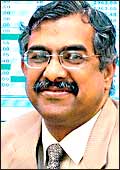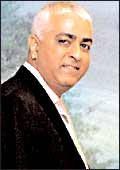 |
| NCDEX’s Kumar: Commodity
check |
It will be some time before
the Forward Contracts (Regulation) Act, 1952 is amended but the
Forward Marketing Commission (FMC) has already started flexing
its biceps by delisting urad and tur from the futures trading
market. The ostensible reason for doing so: To control escalating
prices of these two commodities.
But almost a fortnight after the ban the spot prices were still
spiraling, tur by 30 per cent and urad by 50 per cent, at the
time of writing. According to Rajesh Verma, Senior Research Analyst
at Agriwatch, a Commodity Research and Market firm, the prices
will take at least a year to come back to their normal level.
So, will delisting really help? "Not at all," says P.H.
Ravi Kumar, Managing Director & CEO, NCDEX. "A medium/long-term
solution would have been to come up with an agriculture policy
that takes care of the supply side issue. The short-term solution
would be to cut import duty on such commodities."
Verma attributes the price rises to a simple chemistry of supply
and demand. "The soaring levels seen last year-when urad
prices hit a high of Rs 4,125 per quintal and tur prices rocketed
to Rs 2,090 per quintal -were not the result of futures trading
but due to the news of weak crop prospects due to poor weather.
In fact, tur might see higher prices this year even in the absence
of futures trading," says Verma. Similarly, he adds, poor
production of pulses last year resulted in supply crunch, which
in conjunction with soaring prices in international markets resulted
in the high domestic prices of pulses. "This had nothing
to do with speculative trading," explains Verma.
Tur prices found wings once the harvest of this season started
in January, as the stockists bought aggressively to encash the
expected shortage of the commodity. The crop is expected to touch
production of 20-21 lakh tonnes this year against last year's
23 lakh tonnes. "By the second half of March, we will get
a clear indication to this year's crop situation and it is possible
that the Commission might want to review the decision in April
again," says NCDEX's Kumar.
-Pallavi Srivastava
Rebel
With A Cause
Investors love the controversial Harish Thawani.
 |
| Nimbus’ Thawani: Taking
on DD Taking on DD |
Flamboyant, shrewd, street-smart
are the most common adjectives used to describe Harish Thawani,
the 46-year-old Executive Chairman of Nimbus Communication. The
state-owned broadcaster Doordarshan (DD) will probably agree with
at least two of those. For, ever since Thawani ventured into the
television business by producing and marketing serials on DD way
back in the 1990s, he's been at loggerheads with it. The most recent
face-off between the two came about when Thawani refused to share
signals with DD for the India-West Indies One-Day cricket series.
Thawani has bagged the rights to telecast all cricket matches happening
out of India till 2010 from the Board of Control for Cricket in
India (BCCI) for $612 million (Rs 2,754 crore). DD (which comes
under Prasar Bharati) duly went to court, which directed Thawani's
channel Neo Sports to share the feed with Doordarshan with a seven-minute
delay.
In early February, however, Thawani got a rude shock when the
Union Cabinet approved the promulgation of an ordinance making
it compulsory for private broadcasters to share the feed of sporting
events of national importance with the public broadcaster. If
Thawani's distressed, his company Nimbus isn't showing it. An
official spokesperson for the company blandly says: "We welcome
a law that lays down fair and equitable rules for sports rights
sharing. We can only comment in detail after the law or ordinance
is actually made public. Meanwhile, we are glad that a Committee
has been formed to agree to a road map for encryption of DD signals
as encryption will put an end to piracy and to unauthorised broadcasts
abroad and in India."
Such controversy and setbacks notwithstanding, Thawani is a
clear favourite amongst private equity investors. Some 18 months
ago he got his first round of PE investment, of $45 million (Rs
202.5 crore) from UK firm 3i. The second round of 3i's funding,
along with new investors Cisco and Oman International Fund (OIF),
together amounts to a total of $125 million (Rs 562.5 crore) into
Nimbus. Thawani says: "Nimbus' consistent year-on-year hyper
growth estimated at 70 per cent (for the last three years)-depth
of management and aggressive expansion plans were key to attracting
the highest quality investors." Till date, Nimbus has attracted
approximately Rs 900 crore ($200 million) of private equity investment.
The new round of funding will be largely deployed towards sports
rights acquisitions, developing global sports events, financing
Indian language and international film production and distribution,
developing further digital content production for wireless and
VOD/IPTV platforms and expanding broadcasting operations. Thawani
plans to launch a movie channel and some other niche channels
in the areas of women and cooking. According to him, the investment
required by the company for a niche channel would be in the range
of Rs 60 crore and for a movie channel it would be around Rs 150
crore. "We are well on track to achieving our goal of being
a billion-dollar company by 2010. For the fiscal year ending March
2006-07, our revenue forecast is in the excess of $250 million
(Rs 1,125 crore)," says Thawani. He expects the sports channel
Neo Sports to achieve an operational breakeven by first quarter
of calendar year 2008.
-Anusha Subramanian
No
Poverty of Ideas
Nobel Laureate Muhammad Yunus has
more miles to go.
 |
| Nobel winner Yunus: Powering
women |
When 66-year-old professor
Muhammad Yunus received the 2006 Nobel Peace Prize, along with Grameen
Bank, he was joined by nine women from the villages of Bangladesh
at the ceremony in Oslo. That was hardly surprising since Grameen
Bank, the institution that he founded in 1976, has a large proportion
of its loans going out to women-that number is as large as 96 per
cent. The women at the Nobel Prize awards ceremony were those who
had borrowed money from Grameen Bank. "We work on a very simple
model. Unlike large banks, we have no paper work and no collaterals,"
says Yunus who was in Mumbai last fortnight.
The success of the Grameen model, particularly that of micro-credit,
has been emulated in over 20 countries. "We lend a lot of
money to women and our average loan size is $130 (Rs 5,850). Every
year, we give out around half-a-billion dollars." Yunus and
Grameen Bank received the Nobel Peace Prize for "their efforts
to create economic and social development from below." Apart
from micro-credit, the bank offers loans in the areas of housing,
education and irrigation, amongst others.
Bringing Groupe Danone into Bangladesh has been Yunus' key achievement.
The French foods major has launched its brand of yoghurt in Bangladesh
for malnourished people. "This was a difficult assignment
and the challenge has been to ensure that it is not visible in
large stores," says Yunus. He adds that the next project
with Danone could be related to water since water in Bangladesh
is quite acidic.
What has perhaps impressed the larger nations about Grameen
Bank's model is the low proportion of non-performing assets (NPAs).
"The trick is to get people to repay in small denominations,"
he says. Yunus, who was educated in Bangladesh and the us, where
he received his Ph.D in Economics, has also been credited with
the launch and success of the Grameen Phone model which today
has brought wireless telephony to the rural areas. "Today,
we have over 300,000 telephone ladies-women subscribers who use
the phone-and the next step is to have internet ladies,"
says Yunus.
Yunus, and Grameen Bank, have achieved plenty but, as far as
Yunus is concerned, there is plenty more that needs to be done.
"By 2010, we want to reduce poverty by half (in Bangaldesh)
and by 2020, we are looking to get across to 100 per cent of our
population with the micro-credit programme.
-Krishna Gopalan When 66-year-old professor Muhammad Yunus received
the 2006 Nobel Peace Prize, along with Grameen Bank, he was joined
by nine women from the villages of Bangladesh at the ceremony
in Oslo. That was hardly surprising since Grameen Bank, the institution
that he founded in 1976, has a large proportion of its loans going
out to women-that number is as large as 96 per cent. The women
at the Nobel Prize awards ceremony were those who had borrowed
money from Grameen Bank. "We work on a very simple model.
Unlike large banks, we have no paper work and no collaterals,"
says Yunus who was in Mumbai last fortnight.
The success of the Grameen model, particularly that of micro-credit,
has been emulated in over 20 countries. "We lend a lot of
money to women and our average loan size is $130 (Rs 5,850). Every
year, we give out around half-a-billion dollars." Yunus and
Grameen Bank received the Nobel Peace Prize for "their efforts
to create economic and social development from below." Apart
from micro-credit, the bank offers loans in the areas of housing,
education and irrigation, amongst others.
Bringing Groupe Danone into Bangladesh has been Yunus' key achievement.
The French foods major has launched its brand of yoghurt in Bangladesh
for malnourished people. "This was a difficult assignment
and the challenge has been to ensure that it is not visible in
large stores," says Yunus. He adds that the next project
with Danone could be related to water since water in Bangladesh
is quite acidic.
What has perhaps impressed the larger nations about Grameen
Bank's model is the low proportion of non-performing assets (NPAs).
"The trick is to get people to repay in small denominations,"
he says. Yunus, who was educated in Bangladesh and the us, where
he received his Ph.D in Economics, has also been credited with
the launch and success of the Grameen Phone model which today
has brought wireless telephony to the rural areas. "Today,
we have over 300,000 telephone ladies-women subscribers who use
the phone-and the next step is to have internet ladies,"
says Yunus.
Yunus, and Grameen Bank, have achieved plenty but, as far as
Yunus is concerned, there is plenty more that needs to be done.
"By 2010, we want to reduce poverty by half (in Bangaldesh)
and by 2020, we are looking to get across to 100 per cent of our
population with the micro-credit programme.
-Krishna Gopalan
|







